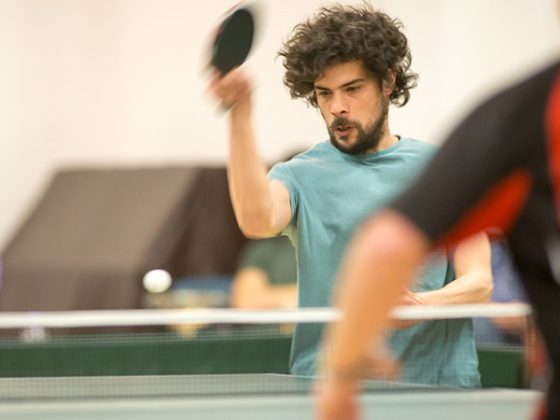More than 95% of local leagues have either already restarted or plan to do so later this season, according to the results of a recent Table Tennis England survey.
However, most leagues have seen a decrease in the number of teams and players, illustrating that there are still challenges presented by the pandemic.
A total of 77 league organisers completed the survey, providing Table Tennis England with important insight into the local league landscape and informing how we can continue to support leagues.
Compared with the 2020-21 season, when local leagues were faced with significant challenges, the current season has started without any forced Coronavirus restrictions.
Positively, the survey suggests that 82% of leagues have already restarted, and a further 14% have plans to restart at some point this season. Only 3% of leagues said they have no plans on restarting this season, typically owing to a loss of suitable venues.
We will continue to support clubs and leagues with accessing funding to return to play, which can include covering additional costs associated with having to move venue. More information about this funding can be found by clicking here. Please also refer to the Level the Table Grant Scheme here.
For most leagues, the number of teams and players has decreased compared with their pre-pandemic position. Together with the challenges around venue access and providing a sufficient safe space for league competitions, responses to the survey also gave examples of where league players are reluctant to return while cases of Coronavirus are still high.
While Coronavirus concerns still exist, our membership figures show that we are at 81.5% of our pre-pandemic position – click here for our latest membership update. This figure has been supported by our Return to the Table campaign, which ran for two months between July and September, to encourage existing and new members back to the sport after the lifting of Coronavirus restrictions.
During the campaign, we showcased a number of positive return-to-play experiences. If you would like us to share your positive return to play story, please send these to [email protected].
Looking at playing format, 3v3 remains as preference, with 16% of leagues choosing to adopt a shorter format compared with previous seasons. For most leagues which have made the decision to adopt a shorter format, doubles has been removed. Table Tennis England is committed to help any league that wishes to adopt a shorter playing via the TT Fast Format Programme. Further information can be found here.
When asked about uncertainties for the future, the main concerns among leagues concerned the lack of junior participation and reduced volunteers to take on the organisation of league competitions.
Following the pandemic, we have supported PremierClubs and leagues wishing to deliver the TT Kidz programme by providing training and equipment for both the Autumn 2021 phase and the upcoming Spring 2022 phase.
Our Autumn 2021 phase saw TT Kidz delivered across 29 venues, up and down the country, with 390 children signed on and becoming Table Tennis England members. From our research, children, as well as their parents or guardians, have enjoyed the programme and are highly likely to recommend.
To manage concerns around volunteering, we will be running a volunteer recruitment campaign in 2022, which will aim to encourage more people involved in table tennis to take up volunteering roles.
Greg Yarnall, Head of Development & Volunteering at Table Tennis England, said: “Thank you to all leagues which completed our recent league audit. The results help us to better understand what position leagues are currently in, the challenges they are facing coming back after the pandemic and the concerns and challenges they have for the future.
“We want to take this opportunity to thank the volunteers who are working tirelessly to re-start their leagues, helping to provide the opportunity for players, past and new, to get playing and feel the physical and mental well-being benefits that we know table tennis brings.
“We recognise the challenges that leagues are under to engage young players and volunteers and as outlined above we have various schemes and initiatives in place to support clubs and leagues with this.
“Whilst the pandemic has provided many challenges for all of us, we also have a fantastic opportunity to reflect as we return to playing and look at whether we need to adapt and re-invent the local competitive offer for our clubs and players.
“This of course will not be the case for all leagues but one thing we have learned through this period is that when the world and individual sports have had to adapt, they have found innovative ways of doing so.
“We should use that learning and the opportunity to think about what the right offer is in each of our local areas to see the sport grow locally and nationally, not just for the next two years, but for the next 10 years to come.
“Good luck to all leagues and we look forward to working with you in 2022.”





